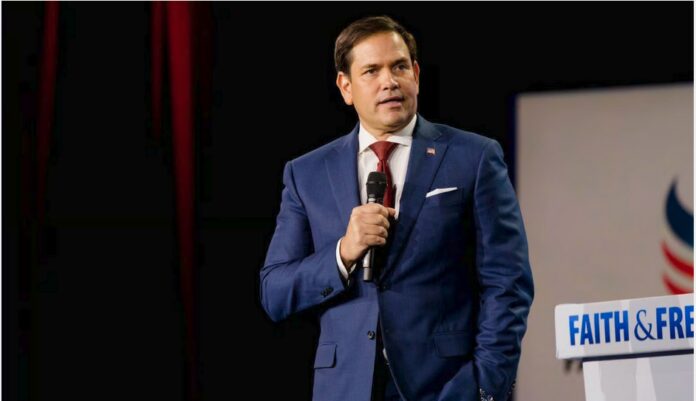
By Eloy Viera Cañive (El Toque)
HAVANA TIMES – Many analysts predicted that tough times were ahead for relations between Cuba and the United States. They argued that Donald Trump’s election, by itself, was enough to foresee the return of a hardline policy toward the island. The appointment of Marco Rubio as the candidate to head the State Department under the new Administration —which begins on January 20, 2025— only confirms these expectations.
But why do analysts predict a tough policy from Trump toward Cuba? Who is Marco Rubio, and why does his involvement suggest that such a path is possible?
Cuban Heritage
Marco Rubio was born on May 28, 1971, in Miami, Florida. He is the second child of a Cuban family that emigrated to the United States in 1956, during the regime of Fulgencio Batista. The Rubio-Garcia family initially settled in Miami but later moved to Las Vegas, where Marco’s father worked as a bartender and his mother as a housekeeper in a hotel.
Marco Rubio’s parents (Mario Rubio Reina and Oriales Garcia) were not US citizens when the senator was born, but they applied for citizenship and were naturalized in 1975.
After living several years in Nevada, the Rubios returned to Florida in 1985. There, the senator graduated in 1993 with a degree in Political Science from the University of Florida and later studied law at the University of Miami.
Raised in the Catholic faith, he was baptized as a Mormon while living in Nevada. However, several years later, he returned to the Catholic Church and now identifies himself (and his family) as a practicing Catholic.
Political Career
While studying law, Marco Rubio worked for Ileana Ros-Lehtinen, a Cuban-American Republican representative from Florida. (Ros-Lehtinen—dubbed “the fierce wolf” by official Cuban propaganda—was the first Hispanic woman elected to the US House of Representatives).
After obtaining his law degree in 1996, Rubio served a term as a member of the West Miami City Commission. He was later elected to the Florida House of Representatives in a special election in 1999. He served in this body from 2000 to 2008, during which he was the leader of the Republican majority (2003-2006) and, between 2006 and 2008, served as Speaker of the House, becoming the first Cuban-American elected to this position.
He launched his campaign for the US Senate in 2010 and was elected. Since 2011, he has held a seat in the Senate, securing three consecutive terms.
In April 2015, Rubio announced that he would run in the following year’s US presidential race. His campaign platform focused on a balanced budget, tax reform, and greater border security. During the campaign, Rubio was mocked by Trump, who nicknamed him “Little Marco.” Rubio, for his part, called Trump “the most vulgar person to ever run for president.” Rubio suspended his campaign after losing the Florida primary in mid-March 2016.
After the verbal clashes between Rubio and Trump and Trump’s election as president in 2017, the Cuban-American became an ally of Donald Trump, and the two developed a close working relationship. After the 2020 presidential election, in which Joe Biden won, Rubio supported Trump’s claim of widespread electoral fraud. However, after the attack on the US Capitol on January 6, 2021, Marco Rubio voted to certify the election results.
The significance of Marco Rubio’s role for Cuba-US relations
If the US Senate confirms Marco Rubio —which, given the Republican majority in the Senate, seems to be a mere formality— he would become the first Latino to hold the office of US Secretary of State. According to the presidential succession line established by the Presidential Succession Act of 1947, Rubio would be fifth in line for the presidency.
Since Mauricio Claver-Carone was appointed senior director for Western Hemisphere Affairs at the National Security Council, no figure with direct ties to Cuba has held positions with such potential influence on the design of bilateral relations between the island and the United States.
During Trump’s first Administration, Claver-Carone was one of the leading advocates of hardline policies not only against Cuba but also against Venezuela. The Granma newspaper described him as responsible for the “overt and covert actions” by Washington against Venezuela, Nicaragua, Cuba, Bolivia, and Ecuador.
Mauricio Claver-Carone has been closely linked to Marco Rubio, who has also been a staunch advocate for maximum pressure policies against leftist authoritarian regimes in Latin America, particularly the Cuban one. If Claver-Carone was seen as one of the architects of Trump’s first-term policy toward Cuba, Nicaragua, and Venezuela, it is not hard to imagine the impact Rubio will have in shaping and implementing a similar policy. This is especially true because he will not need a lobby to advise him on Cuba policy and will have much more power over the Administration’s international policy than Claver-Carone ever had at the National Security Council.
The future Secretary of State has repeatedly insisted that the Cuban regime represents a national security risk for the US due to its relationship with adversaries like China —the country that the Florida senator considers the greatest rival the United States has ever had.
In April 2024, Rubio emphasized: “Cuba has a long history of military and intelligence cooperation with the communist government of China (…). In many cases, we have not done enough to create alternatives to what China has done in many countries.”
In August 2024, when presenting a resolution in the Senate condemning the Cuban regime, Rubio stated: “The world is witnessing the many ways in which the Castro/Diaz-Canel regime has served as a puppet of communist China, Iran, and, more recently, Russia. The United States has a moral duty to defend our nation’s interests, and we must continue to support democratic order and justice in our hemisphere.”
First published in Spanish by El Toque and translated and posted in English by Havana Times.
Read more from Cuba here on Havana Times.




